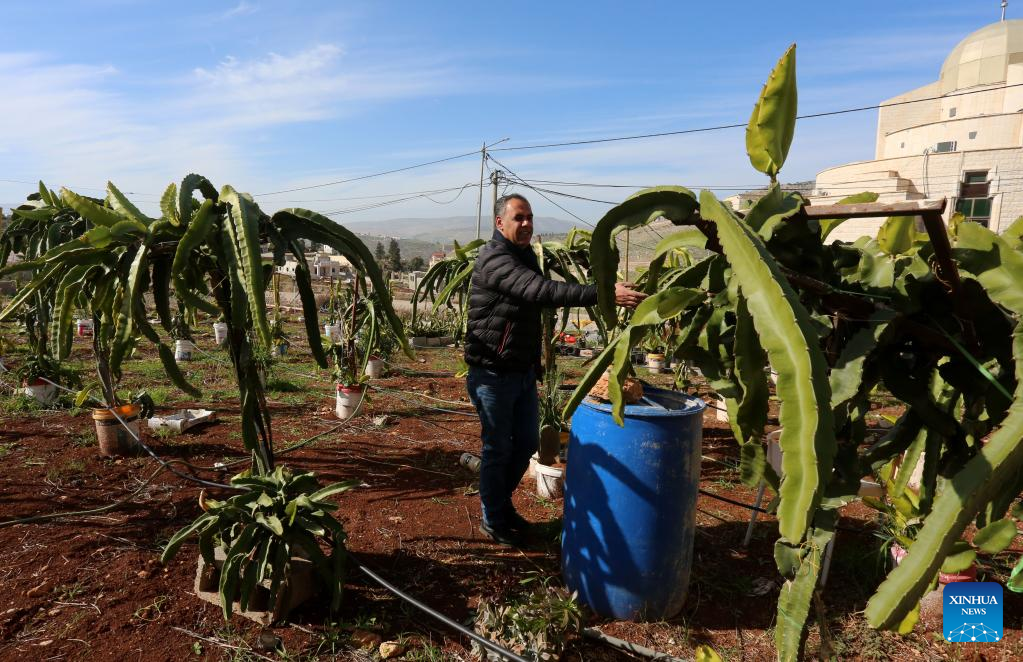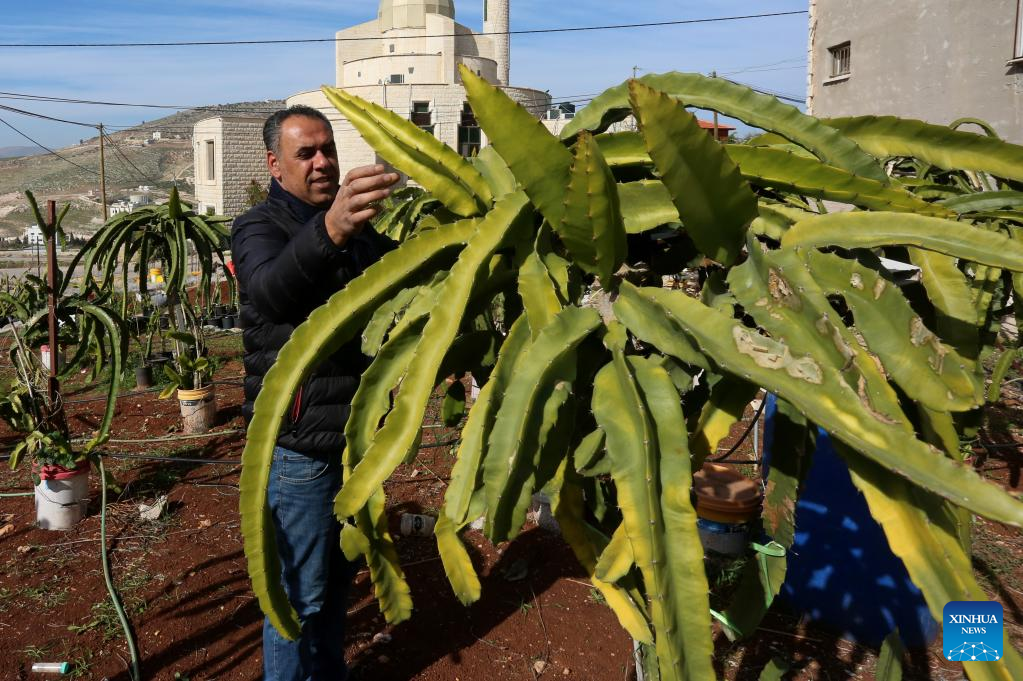
Palestinian farmer Munir Daraghma works at his Dragon fruit farm in the West Bank city of Tubas, on Jan. 12, 2022. (Photo by Nidal Eshtayeh/Xinhua)
by Sanaa Kamal
RAMALLAH, Jan. 12 (Xinhua) -- Dragon fruit, also known as "pitaya," is not typical to the West Bank, but it does not prevent Munir Daraghma, a Palestinian farmer, from growing it.
The 40-year-old father of four told Xinhua that he came up with the idea five years ago when he saw it for the first time.
"It was a strange fruit and so expensive, but I bought it out of curiosity to get to know this exotic fruit," the middle-aged man said, adding "it was delicious and I had never tasted anything like this in my life."
Daraghma dreamed of having his own farm planting dragon fruit, and it has been the main reason that pushed him to research about it.
Dragon fruit is characterized by its attractive pink color, deliciously sweet taste, and oval shape. It belongs to the family of cactus, with its origins in Mexico, South and Central America, East Asian countries, and other countries with hot climates.
"At the beginning, I thought I would not be able to grow this unique fruit in the West Bank, as it has a temperate climate. And I prepared myself for failure," the man recalled.
He asked a local merchant who frequently travels to China to buy him about 200 seedlings of fruit with 3,000 U.S. dollars, and cultivated them on his 100-hectare farm. He also set up a water network for them.
After years of hard work, the farmer has successfully produced his favorite fruit and sold them in local markets.
"Every month, my farm produces dozens of kilograms of dragon fruit and I gain hundreds of dollars that help me to keep my family afloat," the man said as he flashed a smile.
Usually, Daraghma markets his fruits in the central vegetable markets or through social media platforms like Facebook. Each kilo of the fruit costs about 10 dollars.
The farmer expressed his hope to expand his farm in the near future to become more than 500-hectare.
Khaled Abu Mutawa, a merchant from Tubas, told Xinhua that the locally grown dragon fruits have become very popular among citizens, and there is a great demand for them.
"Despite the existence of different types of fruits and the citizens' lack of knowledge about them, the dragon fruit grown by Daraghma is of high quality in terms of taste, shape, and color, which makes it popular," the merchant said.
Abu Mutawa expects that if the cultivation of dragon fruit expands, its prices may drop respectively, which will make them more affordable.
Meanwhile, Daraghma's project has been praised by the Ramallah-based Palestinian Agriculture Ministry.
Abdullah Lahluh, the undersecretary of the ministry, told Xinhua that his institution encourages all individual agriculture projects to introduce new varieties of fruits and vegetables, and expand the production circle for tropical plants.
"The ministry is adopting a new strategy in changing traditional farming patterns to modern ones, expanding the production circle, and introducing new varieties to the agricultural production process," he said.
He added that diversity in production is one of the most important issues that the ministry is working on within its new strategy, as it witnessed success in planting some tropical plants in the Palestinian territories, which bears two goals of achieving self-sufficiency and exporting abroad. ■

Palestinian farmer Munir Daraghma works at his Dragon fruit farm in the West Bank city of Tubas, on Jan. 12, 2022. (Photo by Nidal Eshtayeh/Xinhua)

Palestinian farmer Munir Daraghma works at his Dragon fruit farm in the West Bank city of Tubas, on Jan. 12, 2022. (Photo by Nidal Eshtayeh/Xinhua)



